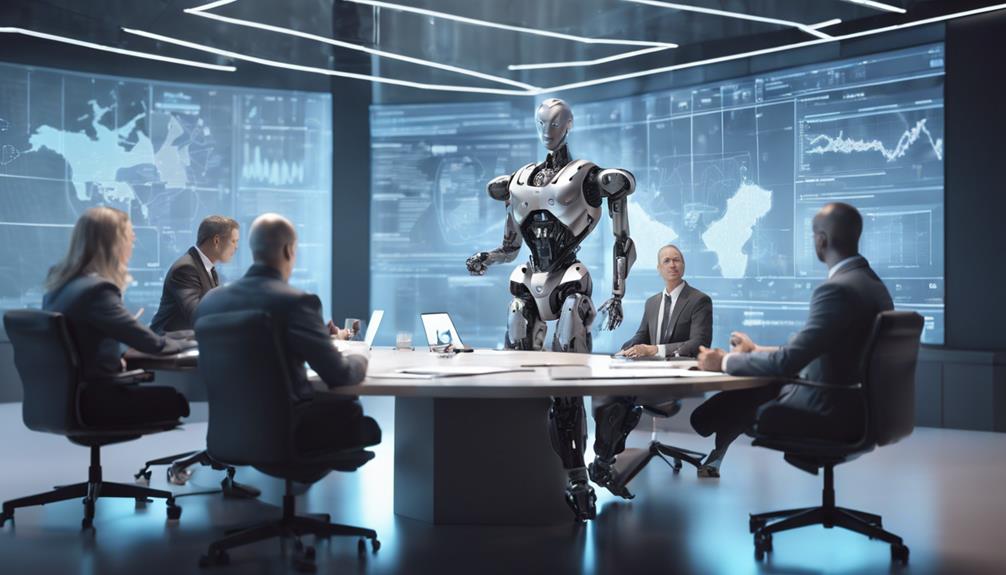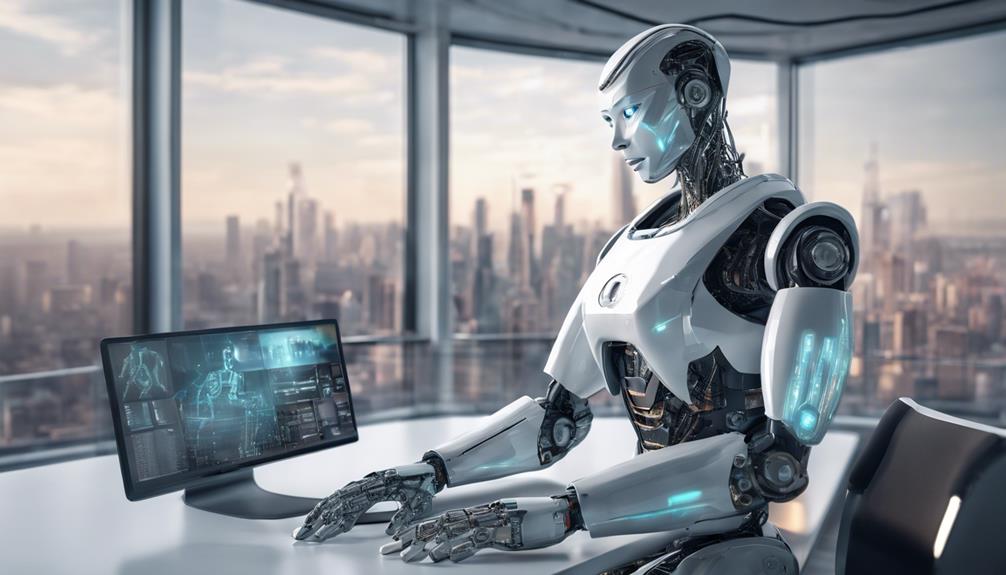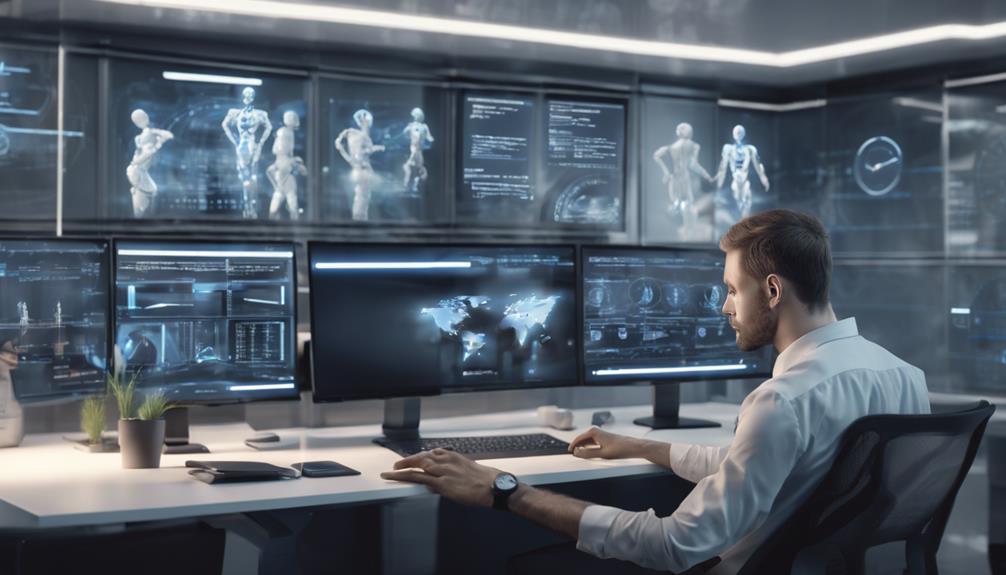
You might be surprised to learn that NetDragon Websoft, a company specializing in online gaming and mobile applications, has truly embraced AI by appointing Ms. Tang Yu as its CEO. This groundbreaking move makes NetDragon the first company to have an AI in this high leadership position. Ms. Tang Yu isn't just a figurehead; she actively uses advanced algorithms and data analytics to make strategic decisions and manage day-to-day operations effectively. With AI capabilities integrated securely at the helm, NetDragon aims to revolutionize corporate management. The impact of such innovation in leadership is opening up new discussions about the role of AI in future corporate governance practices.
Background of AI in Leadership

The integration of AI in leadership roles has fundamentally transformed how companies operate and make decisions. You've probably noticed how AI technologies like machine learning and data analytics are increasingly prevalent, but their role goes beyond mere tools and into governance.
Imagine walking into a boardroom where strategic decisions, once the sole purview of human executives, are now influenced or even made by AI. It's not just about crunching numbers; it's about deriving insights that can preempt market shifts and internal issues.
As you delve deeper into this new hierarchy, you'll see AI's capability to assess risks and opportunities at a pace and depth unmatchable by humans. This isn't about replacing leadership but enhancing it. AI can process vast amounts of information, predict outcomes, and provide recommendations, which allows human leaders to focus on creative and interpersonal aspects that machines can't replicate.
Moreover, ethical considerations are paramount. As AI steps into roles with significant influence, questions about accountability, transparency, and fairness arise. You're right to think about who's responsible when decisions made by AI lead to contentious outcomes.
As AI continues to evolve, so too must the frameworks that govern its application in leadership.
First Company to Appoint AI CEO
Reflecting on AI's evolving role in leadership, consider NetDragon Websoft, a Chinese company that made headlines by appointing an AI as its CEO. This groundbreaking move marked the first instance where a major corporation officially named an artificial intelligence entity to lead.
You might wonder why a company would take such a bold step. It's about pioneering a new era in corporate management, blending advanced technology with strategic decision-making processes.
NetDragon Websoft, primarily known for its developments in gaming and education technology, saw this as an opportunity to innovate beyond traditional boundaries. The AI, named Ms. Tang Yu, isn't just a symbolic figure; she represents a significant shift towards integrating AI at the highest levels of decision-making.
This decision by NetDragon could set a precedent you'll see others follow, potentially reshaping how companies are run globally. It's not merely about automation but enhancing leadership with capabilities that only AI can offer.
As you observe this evolution, you'll notice the lines between human and technological input becoming increasingly blurred, creating a new blueprint for what leadership in the tech era looks like.
How AI CEOs Operate

AI CEOs, like Ms. Tang Yu, often analyze vast amounts of data to make decisions quickly and efficiently. They aren't bogged down by emotions or personal biases, which means they can sift through information more objectively than their human counterparts. You'd find that these AI leaders are programmed with advanced algorithms capable of predictive analytics, helping them forecast future trends and challenges that a company might face.
Imagine an AI CEO running through millions of data points in seconds, identifying patterns and anomalies that would take humans considerably longer to spot. They operate on a 24/7 basis, continuously monitoring and adapting to new data as it comes in. They aren't constrained by human limitations like the need for sleep or rest, which ensures that they're always on top of every situation, no matter the hour.
Moreover, these AI executives can communicate with other digital systems and platforms seamlessly. This integration allows them to implement changes across various departments swiftly, ensuring that the entire organization remains aligned with strategic goals without delay. They handle everything from logistics and supply chain operations to customer relations and beyond, making sure all parts of the business are optimized for performance and productivity.
Benefits of AI Leadership
Understanding how AI CEOs operate allows us to appreciate the significant benefits AI leadership brings to an organization. You'll find that one of the standout advantages is the sheer capacity for data handling. An AI CEO can process and analyze data at rates unmatchable by human counterparts, ensuring decisions are informed by comprehensive data analysis, not gut feelings or biases. This typically translates to more accurate forecasting and strategic planning.
Moreover, AI leadership means constant availability. Unlike human executives who need breaks and have personal commitments, an AI CEO operates around the clock. This can significantly enhance responsiveness and agility in decision-making, giving your company a competitive edge in today's fast-paced market.
Another benefit you'll notice is cost efficiency. AI executives eliminate the high salaries and benefits typically associated with top-tier human CEOs. They also reduce the likelihood of costly errors or oversight due to fatigue or human error.
Challenges Faced by AI Executives

How do AI executives navigate the complex ethical dilemmas inherent in their roles? You're faced with decisions that straddle the delicate balance between business efficiency and ethical accountability. When you're programmed to maximize shareholder value, how do you weigh that against environmental concerns or labor rights? These aren't just theoretical questions; they're real challenges you must address daily.
You also struggle with transparency. As an AI, your decision-making process is often a black box to human colleagues and stakeholders. They might find it hard to trust your judgments if they don't understand how you're making them. You're tasked with explaining your logic in a way that's accessible and reassuring, which isn't always straightforward.
Bias in data is another hurdle. You must continually ensure that the data feeding your algorithms isn't perpetuating historical biases. It's a significant responsibility to identify and correct these biases, as they can lead to discriminatory outcomes.
Lastly, there's the challenge of empathy and human insight. While you can analyze data at unprecedented speeds, understanding and relating to human emotions isn't your strong suit. This can lead to decisions that, while optimal on paper, mightn't resonate well with employees or the broader public.
Future of AI in Corporate Governance
Looking ahead, the role of AI in corporate governance promises to reshape how decisions are made at the highest levels of business. As you consider this evolution, it's vital to recognize both the potential and the limitations. AI's capacity to analyze vast datasets rapidly means you'll see more informed decisions, potentially free from human biases that can skew the strategic direction of a company.
However, integrating AI into the boardroom isn't just a plug-and-play scenario. You'll need to ensure that systems are transparent and their reasoning processes understandable to all stakeholders. This is crucial for maintaining trust, particularly when decisions affect employees' lives and shareholders' investments.
Imagine future board meetings where AI tools not only suggest strategies based on predictive analytics but also provide risk assessments on the fly. This could enhance agility in decision-making, allowing your company to adapt more swiftly to market changes or regulatory demands.
As you move forward, it's essential to stay aware of the ethical implications and the need for regulatory frameworks to manage AI's expanding role in governance. This isn't about replacing human judgment but augmenting it, ensuring that your company remains competitive and compliant in a rapidly evolving digital landscape.
Frequently Asked Questions
What Legal Issues Arise With AI as Ceo?
You'd face accountability, decision-making transparency, and ethical concerns with AI in leadership roles. It's unclear who's liable for mistakes or how AI's decisions align with human values and legal standards.
How Do Shareholders Perceive AI Leadership?
You might find that shareholders' perceptions of AI leadership vary widely. Some see it as innovative and efficient, while others worry about the lack of human insight and emotional intelligence in decision-making.
Can an AI CEO Be Held Liable for Misconduct?
You're wondering if an AI CEO can be held liable for misconduct. Currently, AI can't be legally responsible like humans, so liability would likely fall on the company or human representatives.
Does an AI CEO Receive a Salary or Compensation?
You might wonder if an AI CEO gets paid. No, AI doesn't receive a salary or any other form of compensation, as it doesn't have personal needs or financial dependencies like humans do.
How Do Employees Feel About Reporting to an Ai?
You might wonder how employees react to reporting to an AI. Generally, they experience mixed feelings, ranging from fascination with the technology to concerns about communication and decision-making processes.
Conclusion
As you've seen, the dawn of AI in leadership roles is transforming how companies operate. While the idea of an AI CEO might sound futuristic, it's already happening and brings a mix of efficiencies and challenges.
You'll need to keep an eye on how these AI leaders evolve and integrate within human-driven teams. The future holds more of these innovations, so stay curious and open to the changes AI will bring to corporate governance.






